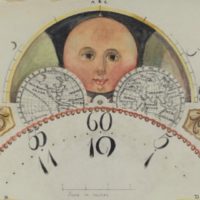 Walking, I am listening in a deeper way.
Walking, I am listening in a deeper way.
Suddenly all my ancestors are behind me.
Be still, they say. Watch and listen.
You are the result of the love of thousands.
– Linda Hogan
Native American poet
As Americans, we are almost by definition cut off from our ancestral roots. One of our founding myths is that of the self-made man, and one of our most abiding fantasies is that all we need to succeed in life is sufficient drive and determination. Mainstream psychology rests on similar premises: that most of our suffering originates with ourselves or our parents and that it may be overcome through thinking more rationally or taking medications.
In contrast, the ancient Greeks cultivated a “tragic sense of life” which rested on a belief in ancestral or collective sin. In Aeschylus’s Oresteia, for example, guilt from a primordial crime is handed down from one generation to the next until it is finally expiated. As the Bible says, the sins of the fathers are visited on the sons down to the seventh generation.
The concept of ancestral guilt as a source of suffering – or, conversely, of ancestral wisdom as a source of strength – is a deeply held conviction in the human psyche. It relates to widespread belief that the ghosts of one’s forebears must be appeased and to the practices of ancestor worship which can be observed in cultures the world over.
In view of their universality, one might call such beliefs archetypal. Jung himself often commented on the formative role played by the ancestors in an individual’s psychological complexes, indeed in his fate. In his autobiography, he wrote, “It often seems as if there were an impersonal karma within a family which is passed on from parents to children. It has always seemed to me that I had to answer questions which fate posed to my forefathers and which had not yet been answered, or as if I had to complete, or perhaps continue, things which previous ages had left unfinished.” In Jung’s view, a person who lacks a connection to his or her ancestral roots is bound to suffer from an absence of depth and meaning, or from what Milan Kundera has called “the unbearable lightness of being.” By the same token, psychological healing can take place when a connection to the ancestral wellsprings is found.
The German psychotherapist Bert Hellinger traces the source of neurosis and illness to a person’s unconscious loyalties to members of previous generations. His work reveals certain incontrovertible laws that operate on the level of the family unconscious and that, like the Furies in Aeschylus, assure that justice is done and balance maintained, that the sins of the fathers are indeed visited on the sons until they are made conscious or atoned for. He posits the idea of a “family soul” that, like the unconscious, does not tolerate the splitting off or exclusion of any experience or member. Out of “blind love,” a child born into the family will unconsciously carry the excluded piece, often taking on the fate of a parent, grandparent, great-grandparent, or other relative in the process.
Family constellations work demonstrates that a person’s life is far more “fated” than we rationalistic moderns suppose, and reveals how bowing or “agreeing” to one’s fate paradoxically frees one from the family participation mystique so that one may begin to live one’s own individual life.
We in the West, and especially in we in America, have been living for centuries inside the myth of a progressive, linear history. Now, as our heroic striving reaches its limit in environmental endgame, it is time for the parabola to begin arcing back. Instead of endlessly seeking the future and the next new thing, it is time to turn and face the ancestors, to tend to the unpaid debts, unhealed traumas, and unredressed crimes of the past.

